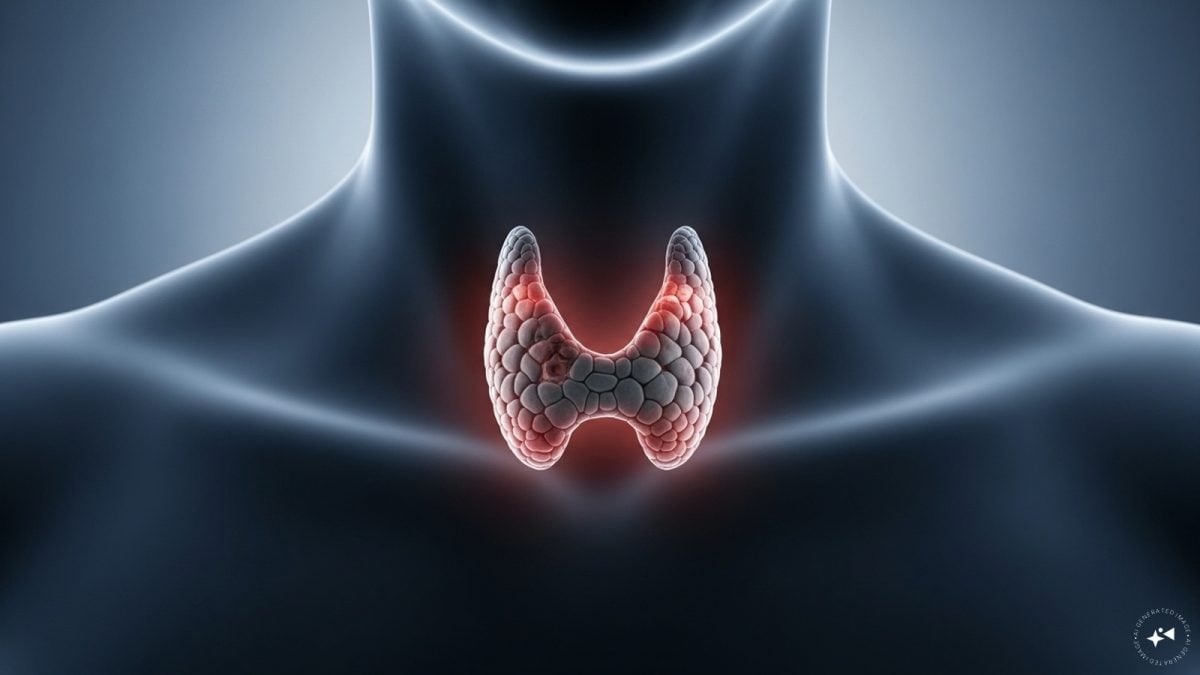Health
Rising Thyroid Cancer Risk Among Young Women: Key Insights

Thyroid cancer is increasingly being diagnosed in younger women globally, a concerning trend that calls for heightened awareness and early detection. This form of cancer often develops silently over years without presenting obvious symptoms. Experts emphasize the importance of recognizing early warning signs, including neck lumps, persistent hoarseness, and difficulty swallowing, which should not be overlooked.
According to Dr. Rebecca Gao, MD, Head and Neck Surgeon at Memorial Sloan Kettering Cancer Center, “Thyroid cancer is relatively common and often grows without any symptoms.” She notes that tumors can sometimes be discovered incidentally during routine imaging or physical examinations. Key physical signs to monitor include a small, painless lump or swelling in the front of the neck, ongoing throat pain, and visible enlargement of lymph nodes. Dr. Gao highlights that while thyroid function tests may appear normal, these signs warrant further investigation, typically starting with an ultrasound and potentially leading to a needle biopsy. Early detection significantly enhances treatment effectiveness.
Dr. Kapil Kumar, Director of Surgical Oncology at Action Cancer Hospital in Delhi, adds that additional indicators of thyroid cancer can include changes in voice, swallowing difficulties, and neck pain that radiates to the ears or jaw. “Most thyroid nodules are benign, but any hard or enlarging lump requires medical evaluation,” he advises. While screening is not recommended for everyone, those with a family history of thyroid cancer, prior radiation exposure, or specific genetic conditions should maintain vigilance. Immediate consultation is crucial for any persistent lump or sudden changes in voice.
In India, the increasing diagnosis of thyroid cancer among young women is particularly noteworthy. Dr. Chinnababu Sunkavalli, Clinical Director of Surgical Oncology at Yashoda Hospitals in Hyderabad, explains that advancements in screening and imaging technologies have contributed to more frequent diagnoses. However, biological and lifestyle factors also play critical roles. Women in their reproductive years are more susceptible due to hormonal influences, including oestrogen, and changes during pregnancy may lead to increased nodule growth. Conditions like Hashimoto’s thyroiditis, which causes chronic inflammation, further raise risk levels. Other contributing factors include genetics, iodine imbalances, and previous radiation exposure.
Dr. Sunkavalli elaborates that lifestyle choices significantly impact thyroid health. “Poor sleep, ongoing stress, and elevated cortisol levels can disrupt thyroid function, increasing the risk of disease,” he notes. Environmental factors, such as air pollution and exposure to radiation from imaging, can also affect hormone balance. Conversely, adopting healthy habits—regular exercise, adequate sleep, and a diet rich in calcium, dairy, and cruciferous vegetables—can help protect thyroid health. “While certain risk factors cannot be changed, maintaining a healthy lifestyle and routine checkups can significantly reduce risk,” he emphasizes.
The prognosis for thyroid cancer patients is generally positive, with survival rates improving significantly in India. Dr. Kumar states, “Thyroid cancer is one of the most treatable cancers, and outcomes in India now closely mirror global standards.” More than 90 percent of cases are classified as papillary and follicular thyroid cancers, boasting survival rates exceeding 95 percent when diagnosed early. Even with regional spread, survival prospects remain strong. Treatment typically begins with surgery, often followed by radioactive iodine therapy to mitigate recurrence risk. For advanced cases, targeted therapies such as tyrosine kinase inhibitors have markedly improved patient outcomes.
Patients who undergo total thyroid removal will require lifelong hormone replacement therapy to manage their metabolism and energy levels. Despite this, Dr. Kumar reassures that with regular follow-up care, most individuals lead healthy, normal lives. Thyroid cancer is frequently referred to as a “good cancer” due to its favorable long-term prognosis.
Experts agree that while thyroid cancer often presents without clear symptoms, early detection is the most effective safeguard. Immediate consultation with a healthcare provider for any signs of a painless neck lump, voice changes, or persistent throat pain is crucial. By fostering awareness, adopting healthy lifestyle choices, and seeking timely medical evaluation, individuals can significantly enhance their recovery and long-term survival rates.
-

 World4 months ago
World4 months agoSBI Announces QIP Floor Price at ₹811.05 Per Share
-

 Lifestyle4 months ago
Lifestyle4 months agoCept Unveils ₹3.1 Crore Urban Mobility Plan for Sustainable Growth
-

 Science3 months ago
Science3 months agoNew Blood Group Discovered in South Indian Woman at Rotary Centre
-

 World4 months ago
World4 months agoTorrential Rains Cause Flash Flooding in New York and New Jersey
-

 Sports3 months ago
Sports3 months agoBroad Advocates for Bowling Change Ahead of Final Test Against India
-

 Top Stories4 months ago
Top Stories4 months agoKonkani Cultural Organisation to Host Pearl Jubilee in Abu Dhabi
-

 Science4 months ago
Science4 months agoNothing Headphone 1 Review: A Bold Contender in Audio Design
-

 Top Stories4 months ago
Top Stories4 months agoAir India Crash Investigation Highlights Boeing Fuel Switch Concerns
-

 Sports3 months ago
Sports3 months agoCristian Totti Retires at 19: Pressure of Fame Takes Toll
-

 Business4 months ago
Business4 months agoIndian Stock Market Rebounds: Sensex and Nifty Rise After Four-Day Decline
-

 Politics4 months ago
Politics4 months agoAbandoned Doberman Finds New Home After Journey to Prague
-

 Top Stories4 months ago
Top Stories4 months agoPatna Bank Manager Abhishek Varun Found Dead in Well









